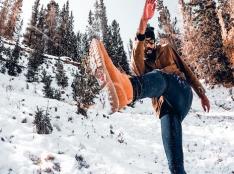Climbing
You may not have to worry about doing any climbing in the sprint races, but you will more than likely have at least a rappel in the longer races. In expedition and 24-hour races, you may also have to do an ascent with jumars. Both are very fun and relatively easy to learn.
Training:Teamwork
Adventure racing is one of the only sports in which you actually have to have your teammates with you, doing exactly what you're doing, glued to your side at all times. That's why adventure racing is just as much an interpersonal journey as a physical one. In the best of times, you will experience moments that will bond you to your teammates in a very special way for life. In the worst of times, you will walk away having experienced the worst aspects of human nature and be left to pick up the pieces of your shattered hopes.
In my experience, a lack of teamwork skills is responsible for at least 40 to 50 percent of the DNFs in adventure racing, and it is far too important a factor to overlook in any discussion about the sport. So here's my two cents:
After years of study in what causes a team to rise from "good" to "world class," I've come to the conclusion that the biggest factors are the attitudes and actions of the individual teammates. In the races my team and I have won, we were not the strongest or the fastest, but we were able to create a "human synergy" -- an ephemeral quality or "magic" that made the TEAM stronger than the collective training and experience of the individual members. If I could bottle it, I would certainly be a millionaire. But after a good deal of thinking about the subject, I have a pretty good idea of the essential elements required for this human synergy. Here's the highlight reel:
8 Essential Elements of Human Synergy
T Total commitment
E Empathy and awareness of teammates
A Adversity management
M Mutual respect
W "We" versus "I" thinking
O Ownership of the project
R Relinquishment of ego
K Kinetic leadership
That's it! I'm spent! That's the full download about getting started in adventure racing from my skull to yours. The rest is up to you! So get out there with your pals and make it happen -- soon. It will be a life-changing and life-affirming experience you will never forget. See you "Out There!"
Find an adventure race in your area.
Find more tips on Adventure Racing and up-to-date information for the active outdoors enthusiast.
Robyn Benincasa has competed in over 15 expedition length adventure races and has won both the Eco-Challenge (Borneo 2000) and the Raid Gauloises (1998). When she's not out playing with her new kiwi teammates on Team Merrell/Zanfel Adventure, she can be found at her real job as a firefighter for the City of San Diego or working on her newest passion: bringing the teamwork skills of adventure racing and firefighting to the corporate world through www.worldclassteams.com and www.flashoverseminars.com
- 4
- of
- 4





.jpg?height=174&mode=Thumbnail&width=234)



Discuss This Article